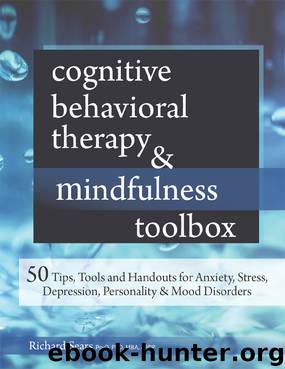Cognitive Behavioral Therapy & Mindfulness Toolbox by Richard Sears

Author:Richard Sears
Language: eng
Format: epub
Tags: Cognitive behavioral therapy mindfulness & toolbox
ISBN: 9781683730682
Publisher: PESI Publishing & Media
Published: 2017-06-29T04:00:00+00:00
Worksheet
Understanding Posttraumatic Stress Disorder (PTSD)
If you have been diagnosed with posttraumatic stress disorder, or PTSD, you have experienced or witnessed at least one life-threatening or very traumatic event, and you are still being affected by it.
Of course, anyone who goes through extreme events will be affected by them. Understanding PTSD may help you realize that what you are experiencing is a normal reaction to something extreme. Despite what you might think sometimes, you are not crazy.
If you have PTSD, you experienced something so horrifying that you do not want to think about it or remember it. Yet, your emotions are firing up strongly, because part of you knows that what you went through was so serious that remembering it could help save your life in the future. There is a battle going on between your cortex, which is the thinking part of your brain, and the limbic system, which is the emotional part of your brain.
This battle between thoughts and feelings takes a lot of energy, and sometimes the emotions burst out as “re-experiencing symptoms.” You might have very vivid and emotional nightmares. The intense feelings of terror you felt in the past might get triggered by things that remind you of the trauma, sometimes without you even knowing why. Sometimes the memories will fire so strongly that you feel like you are back in the old trauma again. Known as “flashbacks,” they can be very scary, and seem quite real. It may be helpful for you to know that these re-experiencing symptoms are just your own brain firing old emotional signals. Your brain is trying to protect you by getting you ready for danger, even though the danger may no longer exist. When you notice re-experiencing symptoms coming up, practice grounding yourself in the present moment, to get your brain out of the past. What do you see, hear, smell, taste, or feel right now, in this moment? If you fill your awareness with what is happening now, there will be less room in your brain for the old thoughts and memories, and the intense emotions will eventually pass.
Because these symptoms are so intense, people with PTSD work hard to avoid triggering them, and also struggle not to feel them. Avoidance only works temporarily, and if the triggers are never dealt with, the symptoms will continue, and the cycle of avoidance will go on and on.
Experiencing a serious trauma changes the way you view the world. Little things may not seem to matter much anymore, and your innocence about the world is shattered because you know how bad things can get. You become hypervigilant, because your brain is constantly worrying about where danger might come from next. You may be irritable and startle easily, because your stress system is amped up and ready to run, freeze, or fight. It is hard to trust people, and you may feel detached from others, so relationships become more difficult and chaotic. Negative thoughts may fill your brain, and it may be difficult to concentrate.
Download
This site does not store any files on its server. We only index and link to content provided by other sites. Please contact the content providers to delete copyright contents if any and email us, we'll remove relevant links or contents immediately.
Should I Stay or Should I Go? by Ramani Durvasula(7669)
Why We Sleep: Unlocking the Power of Sleep and Dreams by Matthew Walker(6725)
Fear by Osho(4740)
Flow by Mihaly Csikszentmihalyi(4698)
Rising Strong by Brene Brown(4463)
Why We Sleep by Matthew Walker(4447)
The Hacking of the American Mind by Robert H. Lustig(4383)
How to Change Your Mind by Michael Pollan(4357)
Too Much and Not the Mood by Durga Chew-Bose(4348)
Lost Connections by Johann Hari(4188)
He's Just Not That Into You by Greg Behrendt & Liz Tuccillo(3900)
Evolve Your Brain by Joe Dispenza(3679)
The Courage to Be Disliked by Ichiro Kishimi & Fumitake Koga(3504)
Crazy Is My Superpower by A.J. Mendez Brooks(3401)
In Cold Blood by Truman Capote(3386)
Resisting Happiness by Matthew Kelly(3341)
What If This Were Enough? by Heather Havrilesky(3311)
The Book of Human Emotions by Tiffany Watt Smith(3309)
Descartes' Error by Antonio Damasio(3279)
